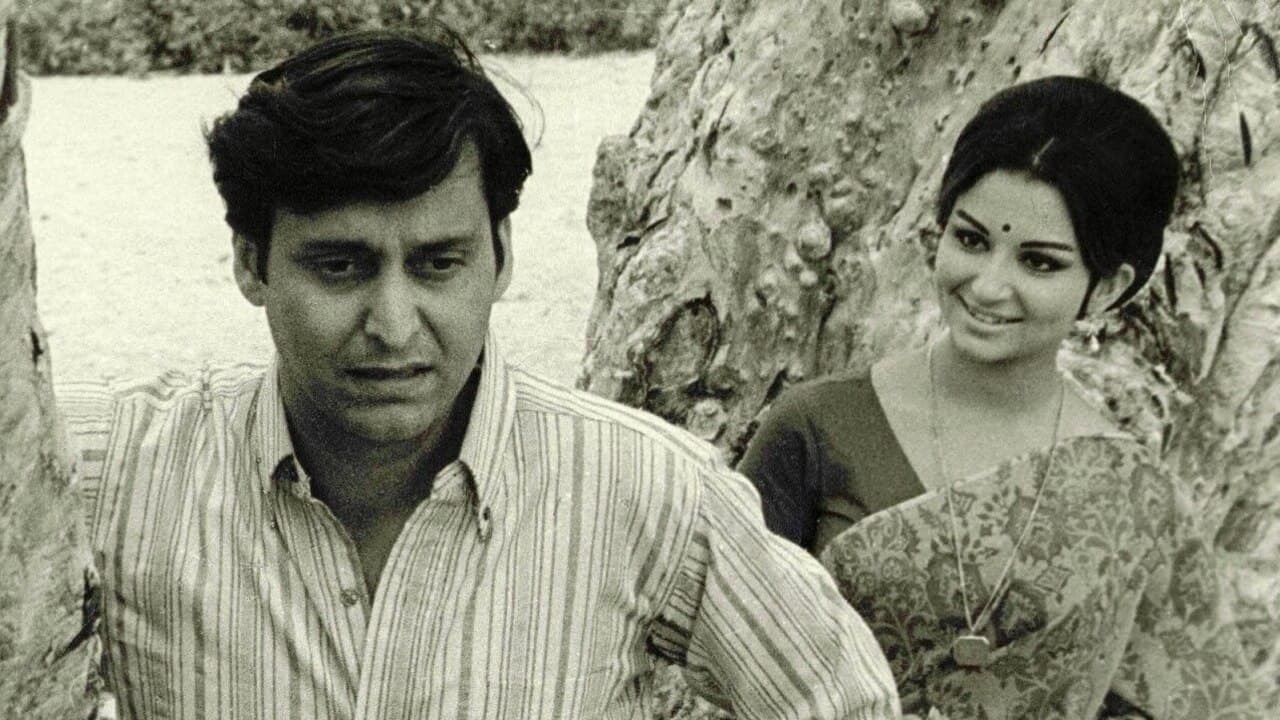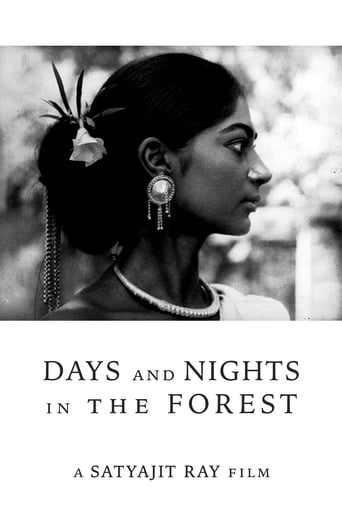Interesteg
What makes it different from others?
Phonearl
Good start, but then it gets ruined
Robert Joyner
The plot isn't so bad, but the pace of storytelling is too slow which makes people bored. Certain moments are so obvious and unnecessary for the main plot. I would've fast-forwarded those moments if it was an online streaming. The ending looks like implying a sequel, not sure if this movie will get one
Rio Hayward
All of these films share one commonality, that being a kind of emotional center that humanizes a cast of monsters.
upnworld.com
Film opens with a shot of paddy fields while a man traveling with his pals in a car ,reads the following " Bengali people are as happy looking at seasons and nature, as they are at looking death in the face". Now I'm not very sure whether this statement is true, but I suspect that this kind of cultured stoicism aptly applies to the director of this movie - Satyajit Ray. Four friends - all young men from Calcutta- go into a forest and plan to stay in a rest house there, while aspiring to have sexual fun with tribal women who are presumed to be liberal in such matters. Of course, this sort of plot is not standard territory for the said director but even with this unlikely template, Ray directs his masterly rays of perspective to illumine the hinterlands and give larger wings to a fledgling premise.Though it is not set in the city or even a village, the film is a composite shot of civilization in decline. But in Ray's world, there is always hope, a calm sense of being obliged to emerge from the ruins, and in A.D.R we also see a beautiful example of strong but tranquil feminism.This latter aspect emerges in the form of Sharmila Tagore who registers a great performance in this movie. In Ghare Baire, Ray made Victor Banerjee essay a model man, and here he has Sharmila Tagore giving us a portrait of the model woman. Kohl-lined beautifully curving eyes, luxuriant hair coiffed into a bouffant, and a softly contoured figure clothed in sari ,all set off a face that can essay feminine mystique as smoothly as it can show child-like amusement. Aparna (Tagore), it is steadily revealed, is gifted intellectually, bears the weight of the past, nurtures a humane mind and yet sequesters all these facets beneath a regally controlled visage that can hint at displeasure as beautifully as it can sport a smile.Technically too, this is an accomplished film with superior camera-work by Soumendu Roy. There is a famous static shot in which the lens stands just outside the car window and looks inside, through the car compartment, and past the other window into the background -4 visual planes hold four different people ,all sporting a range of interesting expressions and emotional dynamics. The other memorable sequence is the Memory Game wherein all the players are seated in a circle, and the lens flicks from one face to another as they play the game.Starting with this script, countless other story-tellers might have produced a work of dissipated effect, but Satyajit Ray makes fine use of the novel by Sunil Gangopadhyay to present not just a sylvan jaunt enjoyed by four young men, but also an elegantly presented humanist tapestry. Some directors don't need the Midas touch, they possess something greater.For full review and other cinema analysis you may visit http://www.upnworld.com/movie/view/id/6/title/Aranyer+Din+Ratri
Rajendra Bhattarai
"Aranyer Din Ratri" is an underrated lyrical masterpiece from the great Satyajit Ray. Its structure is one of the most musical of Ray's films, yet it remains one of the most scathing indictments of pompous urban men. A must see. The memory game sequence alone is worth the price of the film.I feel compelled to respond to Ravenus, who writes: "Simi Garewal's hilariously accented Bengali makes her tribal character a hard act to digest." We must remember that Duli, the character Simi plays, is not a sophisticated woman from Calcutta, but a tribal woman from Palamau, which is 300 miles west of Calcutta. Her accent is perfect for the character.
Muntasim Tanvir
As a passionate movie buff, I have the highest regard for Ray's films. That has been reconfirmed after watching this subtly nuanced film from Ray. To the casual viewer, it might seem like the escapades of four middle class gentlemen when they go out of their constrictive surroundings into the wilderness and meet three women. However, a rigorous viewing will expose different layers, some surprising, and others not so surprising. With flawless and fluid direction, Ray tells a story of love lost, confidence regained, inhibitions of a conservative society blown away, overwhelming sadness, and the joy and freedom of coming close to nature. Even though it is quite an old film, it speaks of the human nature and its eternal characteristics so beautifully, that it does not seem dated at all- which is the mark of a classic. Highly recommended.
Ravenus
ARANYER DIN RATRI – Satyajit Ray**MAY contain spoilers** (but it's not a mystery film so...)ADR is a beautiful chamber piece from a director who does this sort of thing very well.The opening sequence shows a motley quartet going on a holiday road trip to a forested area. They are friends, but each coming from a separate milieu and with a different temperament: Ashim (Soumitra Chatterjee, the lead in many of Ray's films), a suave and successful executive, is the unofficial leader. The neat and shy Sunjoy is a conventional pen-pusher tied to the mores of middle-class existence. Hari, a cricketer is short tempered and impulsive, while an unemployed Shekhar is the joker of the group. They halt en route at a vacant government guest house, where they intend to spend a few days. The film chronicles this interval, giving us an insight into the character of these men and the interaction they have with other people, often provoking them into reflection or change.We get an insight into their personalities in the initial period of their holiday, their sense of needing to break convention to feel some freedom from their daily routine – they bribe the caretaker to assign the guest room to them, refrain from shaving, launch drunken diatribes at the local arrack shop…the hedonistic lifestyle in short. These scenes are presented with a wholly observant attitude, never persuading the audience to either like or dislike the characters.Things take a big turn when they run into a couple of charming ladies living at a nearby bungalow. Invited by the surprisingly trustful and hospitable patriarch of the house, they meet the lovely enigmatic Aparna (Sharmila Tagore) and her cheerful but widowed sister-in-law Jaya. This part of the film is a beautiful study of the mental processes of male-female relationships in modern society: The rituals of socially acceptable cordial behavior mixed with the low-key sensuality and courtship that occurs at the outset of growing acquaintance with the opposite sex. Both Aparna and Jaya are warm-natured, confident and sophisticated women, and one well identifies with the sense of yearning mixed with hesitation that develops within the men when they interact with them. In the while Hari gets passionately involved with a young tribal woman, Duli (Simi Garewal, of all people).The last phase of the film is when their interactions have proceeded just beyond the preliminary stage. Ashim learns enough about Aparna for him to regard her as more than one of the city women he meets at so many parties, and observes aspects of her nature that lead him to feel guilt for his superficial self-oriented thinking. Sunjoy who grows increasingly comfortable in the company of Jaya gets a jarring moment; and Hari's heated pursuit of Duli ends in a rude blow. But this is not to say that the film ends on a dark note…not at all. Life for our characters goes on…and who knows what the future will bring? ADR's main strength is the completely natural way it presents its characters and situations. We've seen courtship rituals and the associated comedy thousands of times on film…a shipload of Bollywood films in the gaudily colored 60's and the 90's onward was devoted to increasingly bizarre and tasteless depictions of social romantic behavior. But you need to see a film like this to appreciate really how intricate and touchingly fragile the whole ritual can be, and how the anticipation of the man-woman relationship relates to and affects the existing behavior and thought process of the persons involved. It takes the deftness of touch of a Ray to show it to us in this light.Which brings me to the rare sour note in my experience of ADR: The 'transformation scene' of Jaya, the details of which I will not spill for the benefit of those that have not yet seen the film. I understand that Ray wanted to force some kind of a confrontation of the issue of Jaya being a widow and the social constraints upon her, but the way he has done it appears to me as very contrived and gauche, and a huge letdown given the immense easy-going charm of Kaberi Bose's performance up to that point.On a slighter note, Simi Garewal's hilariously accented Bengali makes her tribal character a hard act to digest.But on the whole ADR is a terrific movie of its type, leisurely but always focused, personal but never self-indulgent.

